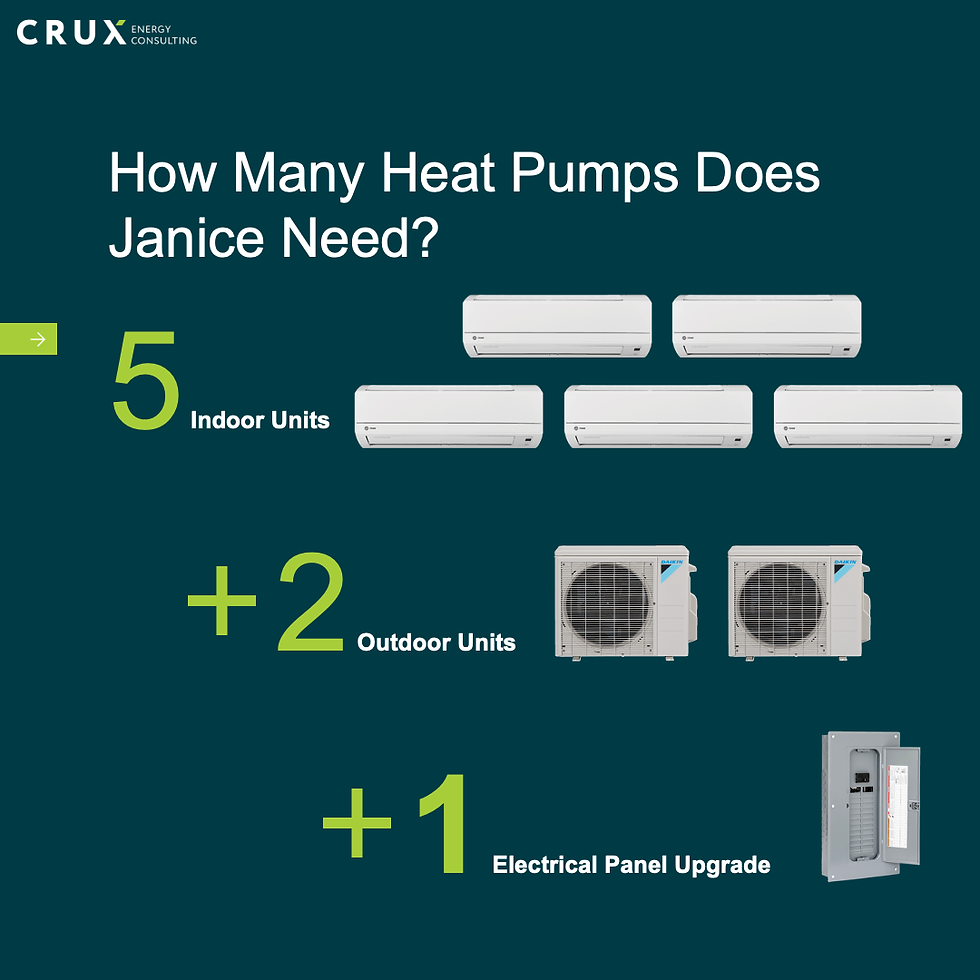Should You Install Heat Pumps In Your Home? An Energy Pro's Personal Experience
- Janice White

- Jul 30
- 3 min read
Earlier this spring, I bought a roughly 3,000 square foot home in Halifax, Nova Scotia. It's a lovely home in exactly the neighbourhood I was looking to move into with a young child, but some of the energy aspects of the home left something to be desired.
Like many homes in the area, the home was built in the late 70's with little insulation in the exterior walls (R10), and an oil tank that feeds hot water baseboards over three closed off floors.
As someone with a career in energy, I knew right away that I would need to make some big decisions about how to heat and cool my new home, and sooner rather than later. Even with an oil tank that had years of life left, there were economics to run through.
And I have a spreadsheet for everything. Not to mention a plan.
First up, was to schedule and complete a Energy Efficiency Home evaluation. Even with my knowledge of options and products, getting the evaluation completed provided me with an official EnerGuide rating on paper. But more importantly, provided me with access to Canada's Greener Homes Loan program, where I could borrow interest free money to complete eligible energy efficiency upgrades.

Now, with an application into the program on file, I could collect some quotes for heat pump installation.
Energy Pro Tip: Always get multiple quotes for heating systems. Ask questions! Compare products and prices!
Heat pumps have come a long way in the past ten to twenty years. Cold-climate models, like those often used in Nova Scotia can operate effectively in temperatures as low as -20°C, making them a strong contender for winters here. But the biggest perk is the efficiency. Depending on the models compared and weather outside, heat pumps can deliver between 200 and 400% efficiency, compared to 80% out of my current oil system.
From a technical standpoint, this was already making sense. But what about the costs?
The upfront cost of a whole-home heat pump system can be expensive, especially in larger home that needs multiple units. My footprint needed five indoor units and two outdoor units to provide coverage for all three floors. And on top of that, there was not enough room on my 100 amp electrical panel to add any additional load to, so I would need to factor in the cost of a new panel. But I'm also looking at a 15 year asset that could reduce my heating costs substantially.

One of the main things I tell people when doing their own assessment like this is to remove all the noise. Variables that would be the same regardless of your decision.
For example, I will need to keep my oil tank as backup heat for those extra cold days, and for insurance purposes. Because of this, there wouldn't be any insurance savings on removing an oil tank, so those dollars were excluded from any analysis.
The monthly access charge for the electricity? Constant in both scenarios and ignored.
Another piece of noise? The price of heating oil. Big fluctuations in oil price happen most winters, and depending on the time you need to fill the tank, could have a big impact. Ultimately I looked at a three year history in my area and settled on an average cost that I was comfortable with in my analysis. Because in the end, we're focused on costs over 15 years, not individual spikes in the short term.
Some additional assumptions are shown below:

With quotes in hand and a good comfort level over my assumptions I could work through the math.
The final result? Heat pumps would pay themselves off in nine years at my new home. Maybe faster if I added in some time of use offerings from the local electric utility. There are a lot of homes in the area that would have a faster payoff than this, but I'm dealing the realities of needing a new electrical panel and a large and choppy floor plan. So nine years still feels like a win.

A majority of my upfront costs are also eligible for an interest free loan. Which makes this a great option for reinvesting the money elsewhere, or simply making the upgrades financially available if they otherwise couldn't have been afforded.
Icing on the cake? Air conditioning. As a woman dancing on the edge of her "why is it so hot in here" era, the idea of standing below a breezy air conditioning unit instead of an open freezer definitely had it's appeal. And that's an ROI no spreadsheet can capture.



